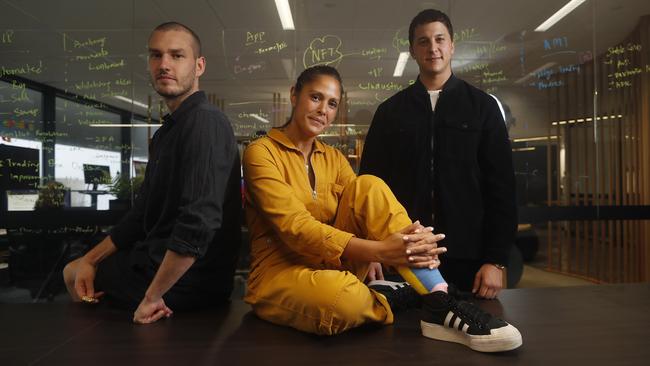From Bored Apes to fine art, Culture Vault aiming to push local NFT market
Culture Vault, launching on Thursday, is taking physical art from Australian cultural figures and turning them digital.

Business
Don't miss out on the headlines from Business. Followed categories will be added to My News.
Far removed from the self-described “degenerate” world of cartoon-like cryptopunks and Bored Apes, art industry veteran Michelle Grey is taking fine art from high-end galleries – sculptures, paintings, architecture and fashion – and turning them into non-fungible tokens, better known as NFTs.
NFTs have quickly earned a reputation as being an unsustainable digital craze – or worse, a straight-up scam – but Grey, chief executive of Culture Vault, says there is genuine pent-up demand from the old-school traditional art world for digital tokens. Auction house Sotheby’s recently reported $100m in NFT art sales last year.
The Sydney-based Culture Vault, launching on Thursday, is taking physical art from Australian cultural figures including Reko Rennie, Stephen Ormandy, Shantell Martin, Adam Briggs and others, and turning them into NFTs for the public to purchase.
Grey is hoping to emulate the success of the likes of Bored Ape Yacht Club NFTs, which have sold for as much as $US3m ($4.2m) and are owned by celebrities including Serena Williams and Justin Bieber, but her art is decidedly more traditional.
“All art is subjective. But things like the Bored Apes and Crypto Kitties mistakenly get put into the NFT ‘high art’ category because of the price that they’re selling for, but they’re much more of a community token,” Grey says.
“It’s about being part of a community who may have a similar mindset. They’re not necessarily buying them because they think they’re high art. I was a complete and utter novice at this, having spent my career in the traditional art space, and it’s been an extremely steep learning curve, but I quickly began to see the value of blockchain technology for artists.
“An NFT can be a digital asset, it can have music associated with it, it can have motion, it can have physical and experiential experiences attached too.”
Culture Vault co-founder and Aus Merchant owner Sean Tolkin says while NFTs are hitting surprisingly high valuations, Culture Vault is aiming to differentiate itself through being a “trusted partner” for the art community.
“There definitely are some scams out there, and you want to always look for a trusted partner and that’s what we’re offering,” Tolkin says.
Culture Vault works with artists on what form their NFT should take, co-founder Sam Linas says, including how rare the token should be, how it should be priced and how value might be added through physical assets. Anyone who buys all 14 Stephen Ormandy alphabet NFTs, for example, receives a physical sculpture, while other buyers receive VIP tickets to a party.
When an NFT is “minted”, a record of proof of ownership and provenance is made on a blockchain, effectively acting as a digital certificate of authenticity that can be easily verified by anyone anywhere in the world. Linas says digital art heists couldn’t happen with his tech.
“We use Polygon, which is a permanent decentralised blockchain, so all of these tokens will probably outlive all of us,” Linas says. “There have been a few exploits on certain platforms, where people have taken Bored Apes out of people’s hands, but with our infrastructure that wouldn’t be possible because we require multi-signature authorisation for all of our wallets.”
Culture Vault’s offering will sit alongside other homegrown NFT projects, including the Salty Pirate Crew, Drop Bears, AussieMates and even the Australian Open, which last month launched its own line of NFTs. While their fiscal survival isn’t guaranteed, many of the projects boast hundreds of community members who chat online daily, bonded by their mutual ownership of a “drop bear” or other artwork.
Another new NFT business launching this week is Meadow Labs, a Brisbane-based firm working with brands on launching digital artwork. Its co-founder, Martin Kelly, says the NFT and blockchain ecosystem has blown up in the past six months, but that its current growth is a speck compared to what is to come.
“There’s a real fear of missing out out there,” Kelly says. “If you go back to 2017 there were only 100 jobs posted for blockchain technologies on LinkedIn, and now it’s thousands. The growth in this industry has exploded.”
”If you go back to 2017 there were only 100 jobs posted for blockchain technologies on LinkedIn, and now it’s thousands. The growth in this industry has exploded, and people are saying blockchain can be measured a bit like dog years at the moment, where six months feels like six years.
“There are many ebbs and flows over time but this is growth that is going to keep on going, and it‘s a fascinating industry to be around.”
Originally published as From Bored Apes to fine art, Culture Vault aiming to push local NFT market





